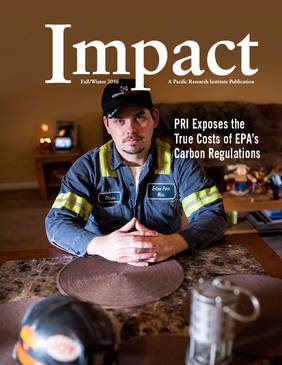On the final day of its 2021-2 term, the U.S. Supreme Court handed down a huge victory for lower energy costs for hard-working Americans when they limited the ability of unaccountable bureaucrats at the U.S. Environmental Protection Agency (EPA) to impose sweeping and costly new energy mandates without the approval of Congress.
PRI’s research helped to educate the justices, with its work by senior fellow in business and economics Dr. Wayne Winegarden being cited in an amicus brief filed by Kentucky Attorney General Daniel Cameron showing the Obama-era plan’s negative impact on the household budgets of Kentucky’s working families.
The PRI study, “The Clean Power Plan’s Economic Impact”, published in Fall 2016, documented how low-income communities across the country would be hit with higher electricity costs if the controversial plan took effect. The hardest-hit communities would see average annual electricity expenditures rising to 10 percent of their income or even higher.
The paper included a state-by-state breakdown of the Clean Power Plan’s impact, and an interactive map detailing the local impact of its regulations on communities across the country.
In 2016, PRI’s Impact magazine interviewed Chris Rose a West Virginia coal miner who was concerned about the impact of the Clean Power Plan on good-paying energy industry jobs.
“I am definitely concerned about these regulations destroying more jobs – including my job and the jobs of family members,” he said.
“There are a lot of hard-working families in West Virginia that struggle to pay their bills and put food on the table. The Clean Power Plan is going to make the task of ‘making ends meet’ nearly impossible for a good majority of families in West Virginia,” Rose added.
At the time of its release, Winegarden said that he hoped a Presidential administration of either party would “review our findings very carefully when charting our country’s energy future and pursue free-market policies that will alleviate the problem of energy poverty.”
While the Clean Power Plan was challenged in court after it was first enacted by the Obama administration, President Trump’s EPA shelved the plan after taking office. The actions of both administrations have been litigated ever since. The Supreme Court ruling gives final clarity on the powers of the federal government to impose sweeping new regulations like the Clean Power Plan.
“A decision of such magnitude and consequence rests with Congress itself, or an agency acting pursuant to a clear delegation from that representative body,” Chief Justice John Roberts wrote in the majority opinion.
PRI has been a leading voice in California and nationwide urging policymakers to embrace free-market policies in lieu of a heavy-handed government approach. Winegarden’s research has documented that government energy mandates have imposed huge costs on Californians, without being particularly effective in reducing emissions. As he found “Legislating Energy Prosperity,” Californians could save upwards of $2,000 annually if these costly policies and mandates were reformed or repealed.
Hopefully, the Supreme Court ruling will bring new momentum for congressional action to enact market-based energy policies that would provide the United States with dependable energy and lower costs.
Tim Anaya is the Pacific Research Institute’s senior director of communications and the Sacramento office.


